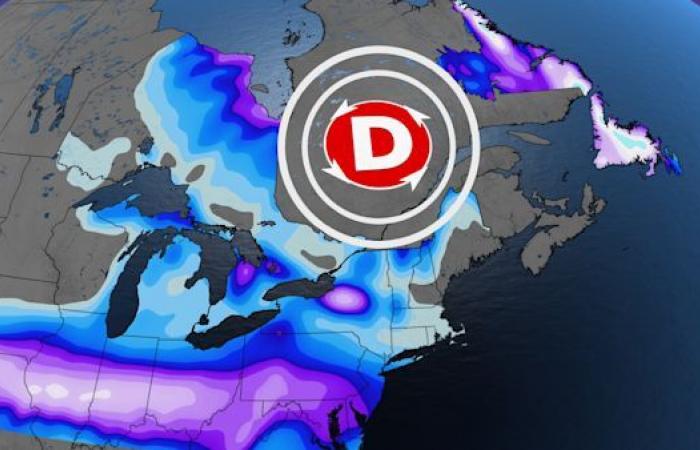Updated January 3, 2025 at 3:00 a.m.
Snow will fall in abundance everywhere, except in Quebec.
In the coming days, three large systems will surround the Belle Province, without ever touching it:
1. Coastal snow squall
The first system will impact the Great Lakes region of southeastern Ontario this weekend. A coastal snow squall occurs when the air temperature is significantly lower than the water temperature, the contrast then creates heavy precipitation. Thus, areas near the Great Lakes could be buried in snow. The accumulations already began last Wednesday: east of Lake Huron, up to 60 cm fell in places. But Quebec, far from bodies of water, will remain out of reach.
2. Weather bomb in the Maritimes
The second system to watch will occur to the east. A weather bomb is preparing to hit the Maritimes overnight from Saturday to Sunday. As a reminder, this phenomenon is characterized by a rapid drop in atmospheric pressure, more precisely at least 24 mb in 24 hours. As is often the case with this type of storm, heavy snowfall is expected in the targeted areas. Only the Magdalen Islands could feel the effects, while the rest of Quebec will be spared.

3. Colorado Depression
Finally, a third system will form in the south of the province. This depression coming from Colorado will affect the northeast of the United States: these areas which have been experiencing a lack of snow since the start of the season could receive a few tens of centimeters of snow until Monday evening. Although southern Quebec is nearby, the snow is expected to remain confined to the border.
-
Quebec protected
How come all the surrounding areas have snow, but we don’t? Paradoxically, it is a previous system that currently protects Quebec. This one, after having dumped a large quantity of snow on New Year’s Day, moves towards the north. It repels approaching disturbances by acting as a shield. We will have to wait a little longer before we find a white coat over the entire province.

With the collaboration of Stéphanie Bergeron, meteorologist.
SEE ALSO: December review: the precipitation did what it wanted
Canada





